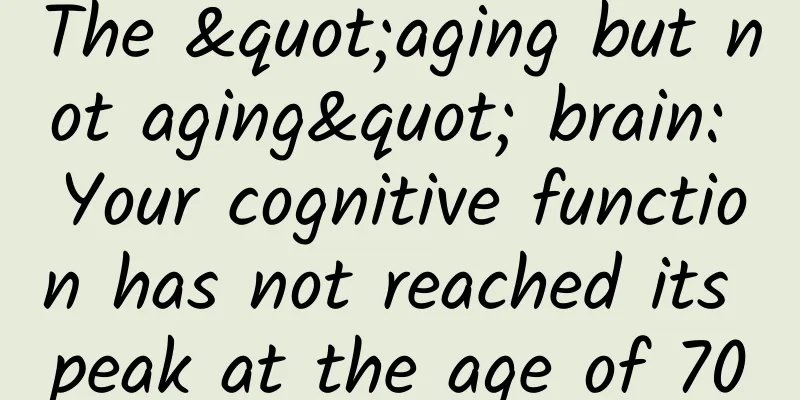The "aging but not aging" brain: Your cognitive function has not reached its peak at the age of 70

|
Written by: Liu Fang Editor: Kou Jianchao Layout: Li Xuewei In many people's minds, human cognitive ability will plummet after middle age. Even many older people often sigh like this: "I'm old and useless." However, a recent study from the University of Lisbon and Georgetown University Medical Center shows that some of our cognitive abilities are still improving at the age of 70. In other words, you who are soaking wolfberries in a thermos cup are still a long way from the peak of the human brain at the age of 70. In this study, the importance of experience and continuous learning from a neurological perspective was verified for the first time in a large sample survey, which may enable us to redefine and view aging, and have a transformative impact on our understanding of the "aging population." The related research paper, titled "Evidence that ageing yields improvements as well as declines across attention and executive functions," was published in the journal Nature Human Behaviour on August 19. (Source: Nature Human Behaviour) "The results are striking," said Michael T. Ullman, professor of neuroscience and director of the Georgetown Brain and Language Laboratory and one of the paper's corresponding authors. "It is widely believed that attention and executive function decline with age, but our study challenges those assumptions. The results suggest that key elements of attention and executive function improve during aging, perhaps because we practice these abilities throughout our lives." Liu Zhaobin, a senior researcher at the Institute of Law and Social Development at Peking University, told Academic Headlines, "China has a tradition of respecting the elderly since ancient times, but we don't have a clear understanding of the cognitive abilities of the elderly. From this study, through exercise, medical care and technology, 60-80 years old is still a golden age and can still make positive contributions to society. As the study shows, the elderly have rich practical experience and knowledge systems, as well as a more tolerant mentality and the confidence to transcend short-term interests." In addition, Professor Liu Zhaobin also believes that "in an aging society, we also need to provide more entrepreneurship and employment platforms for the elderly based on their real cognitive abilities and social resources, so as to mobilize their potential. It is also necessary for us to develop better sports, psychological and entertainment consumption methods based on the cognitive level of the elderly, so as to reduce social costs such as elderly medical insurance and further stimulate the cognitive potential of the elderly." The ageing brain In this study, in order to obtain reliable data with broad representation, the research team tested the attention and executive function of 702 middle-aged and elderly people (58-98 years old). Previous studies have shown that 58-98 years old is the age group with the greatest cognitive changes in humans. Through the attention network test (ANT), the research team found that although the participants' alerting ability would decline with age, their orienting and executive inhibition abilities would improve with age. That is to say, although the elderly need longer to respond to alert information, they can spend less time allocating brain resources and suppress distracting or conflicting information, so as to focus the brain on important things. This may be why we think some elderly people are more "wise". John Verssimo, the first author and one of the corresponding authors of the paper and an assistant professor at the University of Lisbon in Portugal, used the example of driving to explain the three different abilities of alertness, orientation, and executive inhibition: "Alertness allows you to prepare before you approach an intersection; orienting behavior occurs when you direct your attention to pedestrians; and executive inhibition allows you to ignore distractions like birds or billboards and focus on driving." Thus, orienting and executive inhibition functions are key components of our cognition, involved in memory, decision-making, and self-control. What’s more, the research team believes that due to the relatively large number of participants and the elimination of many alternative explanations, the findings are reliable and have broad application implications. Figure | Results of a large-scale sample analysis of alertness, orientation, and executive inhibition (Source: the paper) So, how much do orienting and executive inhibition increase from middle age to old age? And do these increases have practical significance in real life? Surprisingly, the results showed that the efficiency of orientation of the elderly (90+) was about 4-5 times higher than that of the middle-aged (50+) sample, while the executive inhibition efficiency of grandparents over 70 years old was about twice that of the middle-aged. The researchers believe that this increase in magnitude has substantial practical significance. Although executive inhibition will decline significantly in the mid-to-late 70s, it is no worse than that of middle-aged people (50+). Taking into account the three cognitive functions of alertness, orientation, and executive inhibition, the brain's executive efficiency actually improves with age, whether in terms of accuracy or response time (RTS). This means that older people are not necessarily less cognitively capable than younger people in terms of spatial navigation, long-term memory encoding and retrieval, decision-making, reasoning, mathematical ability, and language processing. There is also a large body of research demonstrating that people with extensive experience in executive function, such as bilinguals or musicians, become better at it as they age. So why does the brain show different changes in different cognitive functions? The researchers believe that this phenomenon may be explained by a combination of neurobiological mechanisms such as decline, maintenance, compensation and reserve. Alertness, orientation, and executive inhibition rely on different brain regions and different neurochemicals, which scientists consider to be independent brain networks. During the aging process, the maintenance and compensation mechanisms of these networks are different. The so-called maintenance and compensation mechanisms are the brain's response patterns to functional decline. Figure | Schematic diagram of the brain's neurobiological mechanism (Source: Paper) The results show that the maintenance and compensation generated by lifelong experience can not only offset the risk of biological function decline, but can even bring about significant functional improvements overall. In particular, the orientation and executive inhibition functions are particularly affected by learning, and therefore have the greatest improvement in neural efficiency. Super Old People Are Coming As numerous studies have shown, older people perform worse than younger people in episodic memory, word recognition, and some complex skills. But they are roughly equal in automatic processes of memory retrieval, language comprehension, and skills practiced throughout life. In terms of "wisdom," emotional regulation, decision-making, agreeableness, and responsibility, they are significantly better than younger people. Therefore, being old is not a natural disadvantage. Since American psychologist Raymond Bernard Cattell distinguished intelligence into fluid intelligence and crystallized intelligence, people have always believed that abstract thinking abilities such as reasoning will decline with aging and there is no room for improvement. In practice, cognitive abilities based on acquired experience, such as skills, language skills, and judgment, can improve with age. The results of this study show that the functions of orientation and executive inhibition involve not only crystallized intelligence, but also fluid intelligence such as abstract thinking. Therefore, traditional theories may be greatly challenged, and understanding the changes in these cognitive functions will allow us to better understand the "super-ageing" phenomenon. Human research on the brain has just begun. With the support of technology and biomedicine, the era of super-agers may be coming. References: https://www.nature.com/articles/s41562-021-01169-7 https://gumc.georgetown.edu/news-release/key-mental-abilities-can-actually-improve-during-aging/ |
<<: The fastest animal in the world may be a relative of your bed! | Species Chat
Recommend
Apple Pay reveals new issue: Cannot add bank cards after system restore
On January 2, although restoring the factory sett...
CircleList (arc-shaped ListView)
Source code introduction The arc-shaped ListView ...
Why Apple paid $3.2 billion for Beats
Apple is about to make its biggest acquisition in ...
Android system has the largest market share, WP is still the third
Kantar Worldpanel ComTech released its quarterly ...
Food is the first necessity of the people. Learn about rice aerospace breeding
As the saying goes, "food is the first neces...
How to establish a user perspective? Use the 7-step analysis method!
What is the user perspective? This is actually a ...
A magical tool for picking up girls, creating Christmas snowflake special effects, additional online hot fixes
I believe that those who opened Taobao on their m...
How to please programmers?
As an operations staff, if my boss told me to go ...
The only martyr among the heroes of "Two Bombs and One Satellite"! Today, we commemorate the 53rd anniversary of Guo Yonghuai's death!
December 5, 1968 Huairen Hall in Zhongnanhai Prem...
My 30 operating notes, you may need
01 Chat with a product manager . He said that it ...
Strategies and methods to guide brand crisis public relations activities!
Introduction: In crisis public relations, making ...
From Weibo to Toutiao to Zhihu, where are the three content giants going?
Weibo's market value today has reached 10 bil...
How to use zero-threshold oCPC delivery?
Baidu's zero-threshold oCPC has been online f...
Xiaohongshu promotion tips: How to operate a Xiaohongshu account?
Not long ago, the news about Xiaohongshu conducti...
Experts: High power consumption of 5G mobile phones will restrict their market launch
The 5G tide is coming in full force. In addition ...









